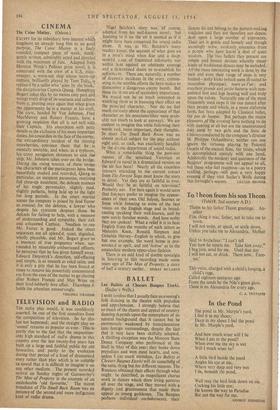BALLET Les Ballets et Chocurs Basques Etorki. (Sadler's Wells.)
I MUST confess that I usually face an evening's folk dancing in the theatre with prejudice and apprehension. I strongly believe that so much of the charm and appeal of country dancing depends upon the atmosphere of its natural background that it cannot but be enormously weakened by transplantation into foreign surroundings, despite the fact that it may have been skilfully adapted. A thrilling exception was the Moscow State Dance Company who performed at the Stoll in May of this year; they broke down prejudices and won most hearts, and now, unless I am much mistaken, Les Ballets et Choeurs Basques Etorki will do somethifig of the same thing but for different reasons. The Russians obtained their effects through what might be described, as magnificent chorus work in dances which drew living patterns all over the stage, and they moved with a dignity and graciousness that made them appear as young goddesses. The Basques perform individual enchafnements, their dances do not belong to the pattern-making tradition and they are therefore not depen- dent upon a large number of exponents. Their art is gentle and homely and though seemingly naive, evidently emanates from a people who have learnt a deal of quiet wisdom. The two ballets they present are sittiple and honest devices whereby many kinds of traditional dances may be included. All'the more interesting work is done by the men and even their range of steps is very limited—jerky kicks (which seem ill-suited to masculine physique); tours en l'air; and excellent grande and petite batterie with non- pointed feet and legs beating well and truly upon the calves. Naturally one of the most frequently used steps is the one named after their people and which, in a more elaborate form, has been adopted by Classical ballet, the pas de basque. But perhaps the major pleasures of the evening have nothing to do with dancing at all but are the unannounced duet sung by two girls and the Suite de Chbeurs conducted by the company's director M. Philippe Oyhamburu; neither can one ignore the virtuoso playing by Polcntzi Gezela of the ancient flute, the txistu, which is accomplished entirely with one hand. Adatittedly the modesty and quietness of the Basques' programme will not appeal to all, but those who feel receptive—as to a poetry reading, perhaps—will pass a very happy evening if they visit Sadler's Wells during


































 Previous page
Previous page